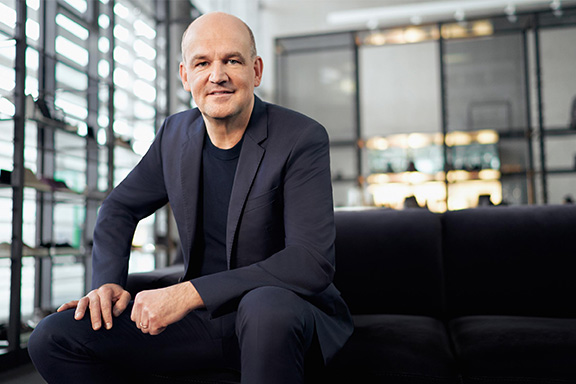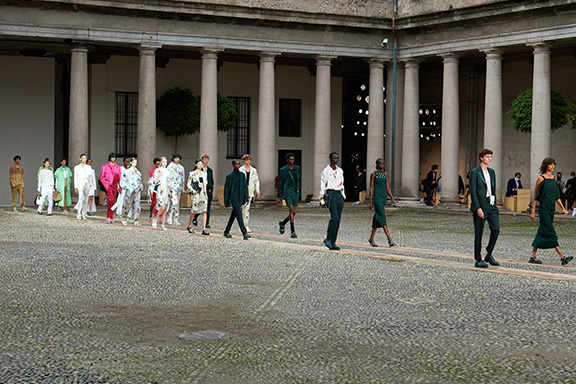Outlook
- Uncertainties surrounding economic and industry outlook remain high in light of the COVID-19 pandemic
- Global business of HUGO BOSS continues to be impacted by the pandemic
- HUGO BOSS currently not able to provide a precise outlook for 2021
Subsequent events
Between the end of fiscal year 2020 and the date of the preparation of this report on March 5, 2021, the global business of HUGO BOSS continued to be impacted by the COVID-19 pandemic. Persisting lockdowns and temporary store closures, in particular in Europe – by far largest region for the Company –, lasting restrictions on public life including comprehensive social distancing measures as well as ongoing international travel restrictions are expected to continue to weigh on the recovery of the overall industry as well as performance of HUGO BOSS, especially in the first half of 2021.
Beyond this development, there were no other material macroeconomic, socio-political, industry-related or Company-specific changes that the Management expects to have a significant impact on the Group’s earnings, net assets and financial position.
Outlook
The following report presents the view of the Management of HUGO BOSS with respect to the Company’s future development and describes the expected development of significant macroeconomic and industry-specific conditions. It reflects Management’s current knowledge at the time the report was prepared, while also taking into account the fact that, if the risks and opportunities materialize as described in the Risks and Opportunities section, actual developments may differ significantly from this outlook, either positively or negatively. Other than the statutory publication requirements, HUGO BOSS does not assume any obligation to update the statements contained in this report. Report on Risks and Opportunities
Economic and industry-specific developments have a major impact on the development of the Company’s operational and financial development. Statements made in this section regarding the Company’s expected business performance are therefore based on certain assumptions about developments in the global economy and in the industry. Over the course of the year, the Group will closely monitor the development of these conditions, in order to respond to possible changes as quickly and comprehensively as possible.
Outlook for the global economy
In its publication of January 20, 2021, the IMF expects the global economy to recover noticeably in fiscal year 2021 from the recession caused by COVID-19 in fiscal year 2020. Based on the assumption that a vaccine will be widely available in industrialized countries and major emerging markets by the summer of 2021 at the latest, the IMF forecasts economic growth of 5.5% for the current year (2020: minus 3.5%). Growth in the first half of the year is expected to be lower than in the second half due to the persistently high number of infections and the associated restrictions on public life in many major industrialized countries. In the second half of the year, however, the IMF expects a significant recovery, which is expected to be driven by increasing vaccine availability and the return to normal public life globally. It is also expected that additional monetary policy measures in Europe and the U.S. will support this development.
Based on these assumptions, the IMF expects the Eurozone to grow by 4.2% (2020: minus 7.2%). Despite persistent uncertainties surrounding Brexit, the economy of Great Britain is forecast to grow by 4.5% in 2021 (2020: minus 10.0%). For the U.S. economy, the IMF expects growth of 5.1% (2020: minus 3.4%), while growth in China is expected to accelerate to 8.1% in 2021 (2020: 2.3%).
Despite these assumptions, the associated risks and uncertainties remain high. It is therefore currently very difficult to predict to what extent the further development of the pandemic – for example, with regard to new waves of infection and lockdowns, or possible mutations of the virus – will ultimately affect the global economy over the course of the year. In addition, it is extremely difficult to forecast any progress in the medical treatment of COVID-19, the global availability and efficacy of the vaccines, any improvement in consumer confidence or potential financial market tension and the respective impacts of these factors on the expected economic recovery.
Industry outlook
The high level of uncertainty regarding the further development of the pandemic is also reflected in the industry outlook. In particular in the first half of 2021, it is likely that the global apparel industry will be significantly affected by the negative implications of the pandemic. Also for the upper premium segment of the apparel industry, which is the best benchmark for HUGO BOSS, industry sales are expected to suffer, especially in the first six months of the year, from the lockdowns imposed in many important markets and the associated store closures. In addition, the persistently low consumer confidence and ongoing international travel restrictions are expected to have a significant negative impact on global industry sales, especially in the first half of 2021.
A joint study by The Business of Fashion and management consultancy McKinsey & Company published on 1 December 2020 describes different scenarios for the development of the global apparel industry in fiscal year 2021. In a scenario of relatively rapid recovery, it is expected that the industry will recover fully from the pandemic by the third quarter of 2022. In this context, a containment of COVID-19 as far as possible as well as state support measures are expected to have a positive impact on industry development already in 2021. Global tourism is forecast to recover noticeably by summer, consumer confidence is expected to return gradually, and larger social events should also be possible in the near future. In this scenario, China is expected to continue leading the recovery, with the apparel industry recording growth of between 5% and 10% over there, as compared to 2019 levels. In the U.S. market, it is expected within this scenario that industry sales will remain 7% to 12% below pre-crisis levels in 2021. Also for Europe, industry sales in 2021 are expected to be 2% to 7% below 2019 levels.
In a less optimistic scenario, on the other hand, The Business of Fashion and McKinsey & Company assume that industry sales will reach pre-crisis levels by the end of 2023 at the earliest. Significant delays in global vaccine availability, further lockdowns, and ongoing travel restrictions would continue to significantly negatively impact overall consumer confidence and thus the industry development over the course of the year. In such a scenario, sales in the U.S. apparel industry could fall by 22% to 27% in 2021 compared with 2019, while Europe could see a 14% to 19% decline. Persistent restrictions on public life and widespread travel restrictions would have a particularly negative impact on premium and luxury goods sales. Therefore, a decline in sales in Europe of up to 40% in this segment cannot be ruled out in such a scenario. For the Chinese market, too, risks exist that a renewed outbreak of the pandemic would have a significant negative impact on industry sales in this market.
Outlook for HUGO BOSS
In light of the persisting high degree of uncertainty regarding the further development of the pandemic and the high risk surrounding the expectations on the further development of the global economy and industry, HUGO BOSS, at this point in time, is not in a position to reliably comment on the further recovery of its overall business and, as a consequence, cannot provide a precise outlook on its key performance indicators. At the time of compiling this report, the global business of HUGO BOSS continues to be impacted by the pandemic. Persisting lockdowns and temporary store closures, in particular in Europe – by far largest region for the Company –, lasting restrictions on public life including comprehensive social distancing measures as well as ongoing international travel restrictions are expected to continue to weigh on the performance of HUGO BOSS, especially in the first half of 2021. In particular with regard to the Group’s own retail business, which usually accounts for two thirds of Group sales, there are high uncertainties with regard to the pace and intensity of the expected business recovery.
Despite the uncertainties outlined above, the Company is confident that the global retail environment will gradually improve over the course of 2021. This is also expected to positively support the recovery of the business of HUGO BOSS, in particular in the second half of the year. For fiscal year 2021, the Company therefore expects that Group sales will be significantly above the level of 2020. Also for the operating result (EBIT) and the Group’s net income, the Company forecasts a strong increase as compared to the prior year. Furthermore, HUGO BOSS expects a moderate increase in capital expenditure compared with the prior year. The focus of investments is expected to be on the Group’s own retail business and the further digitization of its business model. Finally, it is forecast that trade net working capital as a percentage of sales will decline moderately in fiscal year 2021.
In light of the persisting high degree of uncertainty regarding the further development of the pandemic, the Managing Board and Supervisory Board of HUGO BOSS intend to propose to the 2021 Annual Shareholders’ Meeting to only pay the legal minimum dividend of EUR 0.04 per share for fiscal year 2020. In doing so, the Company aims at further strengthening its internal financing capability. Nevertheless, HUGO BOSS remains confident that it will continue to generate significantly positive free cash flow in the future on the basis of a general recovery of its business and due to its highly free cash flow generating business model. This, in turn, should enable the Group to return to an attractive dividend policy. Group Strategy


